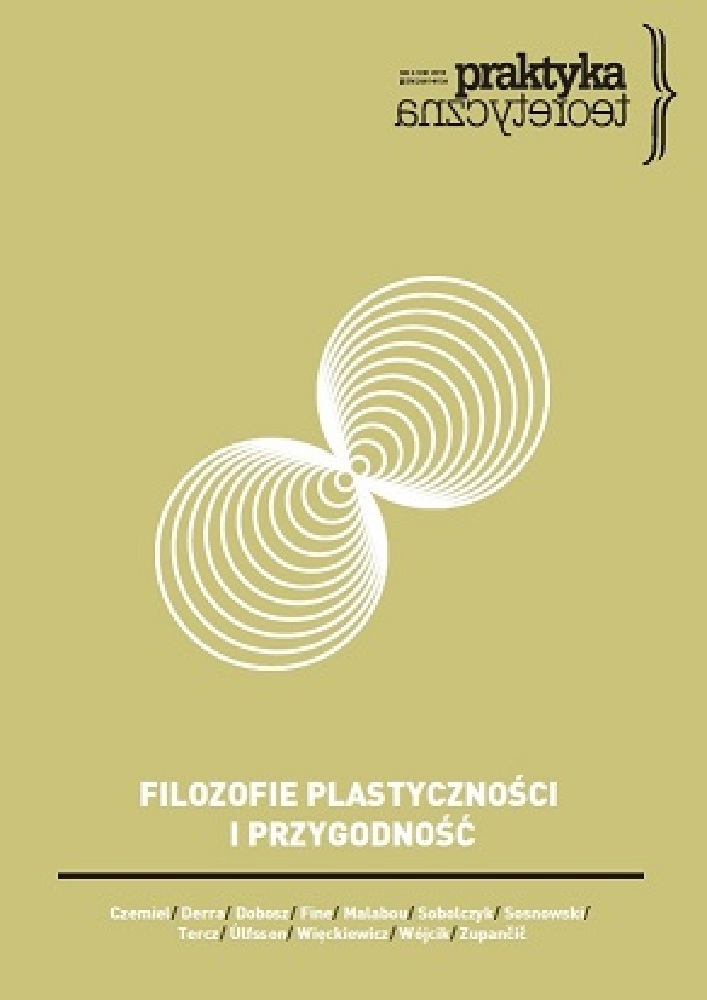Abstract
The article is an interpretation of the concept of the end of religion in Hegel’s philosophy, based on the analysis of three issues:1. The relationship between religious imagination and speculative philosophy – i.e. the idea of the sublation of religion into philosophy.
2. The Hegelian understanding of Christianity (presented in Encyclopaedia of the Philosophical Sciences and Lectures on the Philosophy of Religion) focused on the idea of incarnation as kenosis, which is interpreted by Catherine Malabou’s theory.
3. The idea of the death of Christ as the death of God himself that constitutes the authentic core of Christianity – as Slavoj Žižek has claimed.
This interpretation leads to the conclusion: the outcome of this death is God qua Holy Spirit, whose historical embodiment is ―objective spirit‖ – revolutionary community of the acts of love.
Funding
filozof
materialista dialektyczny
asystent naukowy w Instytucie Nauk Politycznych PAN. Przygotowuje doktorat poświęcony filozofii społecznej Hegla. Członek kolektywu redakcyjnego Praktyka Teoretyczna
References
Ewangelia Tomasza. 1986. Tłum. Wincenty Myszor. W Apokryfy Nowego Testamentu t. I, red. Marek Starowiejski. Lublin: Towarzystwo Naukowe KUL.
Gramsci, Antonio. 1991. Zeszyty filozoficzne. Tłum. Barbara Sieroszewska i Joanna Szymanowska. Warszawa: PWN.
Hegel, Georg Wilhelm Friedrich. 1990. Encyklopedia nauk filozoficznych. Tłum. Światosław Florian Nowicki. Warszawa: PWN.
Hegel, Georg Wilhelm Friedrich. 1995. Vorlesungen über die Philosophie der Religion. Band 3: Die vollendete Religion. Hamburg: Felix Meiner Verlag.
Hegel, Georg Wilhelm Friedrich. 2002. Fenomenologia ducha. Tłum. Światosław Florian Nowicki. Warszawa: Fundacja Aletheia.
Hegel, Georg Wilhelm Friedrich. 2006a. Wykłady z filozofii religii, t. I. Tłum. Światosław Florian Nowicki. Warszawa: PWN.
Hegel, Georg Wilhelm Friedrich. 2006b. Wykłady z filozofii religii, t. II. Tłum. Światosław Florian Nowicki. Warszawa: PWN.
Hegel, Georg Wilhelm Friedrich. 2011a. Nauka logiki, t. I. Tłum. Adam Landman. Warszawa: PWN.
Hegel, Georg Wilhelm Friedrich. 2011b. Nauka logiki, t. II. Tłum. Adam Landman. Warszawa: PWN.
Hegel, Georg Wilhelm Friedrich. 2013. Wykłady z historii filozofii, t. I. Tłum. Światosław Florian Nowicki. Warszawa: PWN.
Hegel, Georg Wilhelm Friedrich. 1969. Zasady filozofii prawa. Tłum. Adam Landman. Warszawa: PWN.
Lenin, Włodzimierz. 1953. „List do towarzyszy‖. W Lenin, Włodzimierz. Dzieła, t. 26. Warszawa: Książka i Wiedza: 183–202.
Löwith Karl. 2001. Od Hegla do Nietzschego: Rewolucyjny przełom w myśli XIX wieku. Tłum. Stanisław Gromadzki. Warszawa: Wydawnictwo KR.
Lukács, György. 1980. Młody Hegel: O powiązaniach dialektyki z ekonomią. Tłum. Marek Jerzy Siemek. Warszawa: PWN.
Magee, Glenn Alexander. 2001. Hegel and the Hermetic Tradition. Ithaca–London: Cornell University Press.
Malabou, Catherine. 2006. The Future of Hegel: Plasticity, Temporality, Dialectics. Tłum. Lisabeth During. Oxfordshire–New York: Routledge.
Malabou, Catherine. 2017. Ontologia przypadłości: Esej o destrukcyjnej plastyczności. Tłum. Piotr Skalski. Warszawa: Fundacja Augusta hr. Cieszkowskiego.
Mikołaj z Kuzy. 1997. O oświeconej niewiedzy. Tłum. Ireneusz Kania. Kraków: SIW Znak.
Mistrz Eckhart. 2013. Dzieła wszystkie, t. I. Tłum. Wiesław Szymona OP. Poznań: Wydawnictwo W drodze.
Nancy, Jean-Luc. 2002. Hegel: The Restlessness Of The Negative. Tłum. Jason Smith i Steven Miller. Minneapolis: University of Minnesota Press.
Pinkard ,Terry. 2000. Hegel: A Biography. Cambridge: Cambridge University Press.
Pańków, Marcin. 2012. „O ontologicznej formie intersubiektywności: Kilka ustaleń w oparciu o Schillera i Hegla oraz rzut oka na dziś‖. W Intersubiektywność, red. Piotr Makowski. Kraków: Universitas: 41–64.
Sosnowski, Maciej Adam. 2013. „»...przypadkowość, arbitralność, bezład...«: O pojednaniu religii i filozofii w myśli G. W. F. Hegla‖. W Deus otiosus: Nowoczesność w perspektywie postsekularnej, red. Agata Bielik-Robson i Maciej Adam Sosnowski. Warszawa: Wydawnictwo Krytyki Politycznej: 91–119.
Sosnowski, Maciej Adam. 2017. „Niestrawności: O dialektyce i wymiotowaniu‖. Przegląd Filozoficzno-Literacki 1: 325–336.
Werner Florian. 2014. Ciemna materia: Historia gówna. Tłum. Elżbieta Kalinowska. Wrocław: Wydawnictwo Czarne.
Zabala, Santiago. 2010. „Wprowadzenie: Religia poza teizmem i ateizmem‖. W Rorty, Richard i Gianni Vattimo. Przyszłość religii, red. Santiago Zabala. Tłum. Stanisław Królak. Kraków: Wydawnictwo UJ: 9–36.
Žižek, Slavoj. 1996. The Indivisible Remainder: An Essay on Schelling and Related Matters. London-New York: Verso.
Žižek, Slavoj. 2001. Wzniosły obiekt ideologii. Tłum. Joanna Bator i Paweł Dybel. Wrocław: Wydawnictwo UWr.
Žižek, Slavoj. 2006. Kukła i karzeł: Perwersyjny rdzeń chrześcijaństwa. Tłum. M. Kropiwnicki. Bydgoszcz–Warszawa–Wrocław: Oficyna Wydawnicza Branta.
Žižek, Slavoj. 2009. "The Fear of Four Words: A Modest Plea for the Hegelian Reading of Christianity". W Žižek, Slavoj i John Milbank. The Monstrosity of Christ: Paradox or Dialectic?, red. Creston Davis. Cambridge, MA–London: The MIT Press.
Žižek, Slavoj. 2012. Less Than Nothing: Hegel and The Shadow of Dialectical Materialism. London-New York: Verso.
Žižek, Slavoj. 2013. Metastazy rozkoszy: Sześć esejów o kobietach i przyczynowości. Tłum. Marek Jastrzębiec-Mosakowski. Warszawa: Wydawnictwo Krytyki Politycznej.
License
“Theoretical Practice” seeks to put into practice the idea of open access to knowledge and broadening the domain of the commons. It serves the development of science, thinking and critical reflection. The journal is published in open-access mode under the CC-BY-NC-SA 4.0 license (detail available here: http://creativecommons.org/licenses/by-nc-sa/4.0/). Articles published in the journal may be freely distributed, stored, printed and utilized for academic and teaching purposes without restrictions.
They should not be, however, used for any commercial purposes or be reconstructed into derivative creations. Access to the journal may not be limited or offered for a fee by any third party.
Prospective authors are obliged to fill in, sign and send back the publishing contract compliant with the CC licencing. [PL.pdf, PL.doc, EN.pdf,EN.doc].
According to this contract, authors grant the journal a non-exclusive right to publish their work under the creative commons license (CC-BY-NC-SA 4.0) without any financial obligation on both sides of the contract.
Before submission authors should make sure that derivative materials they use are not protected by copyright preventing their non-commercial publication. Authors are responsible for any respective copyright violations.
